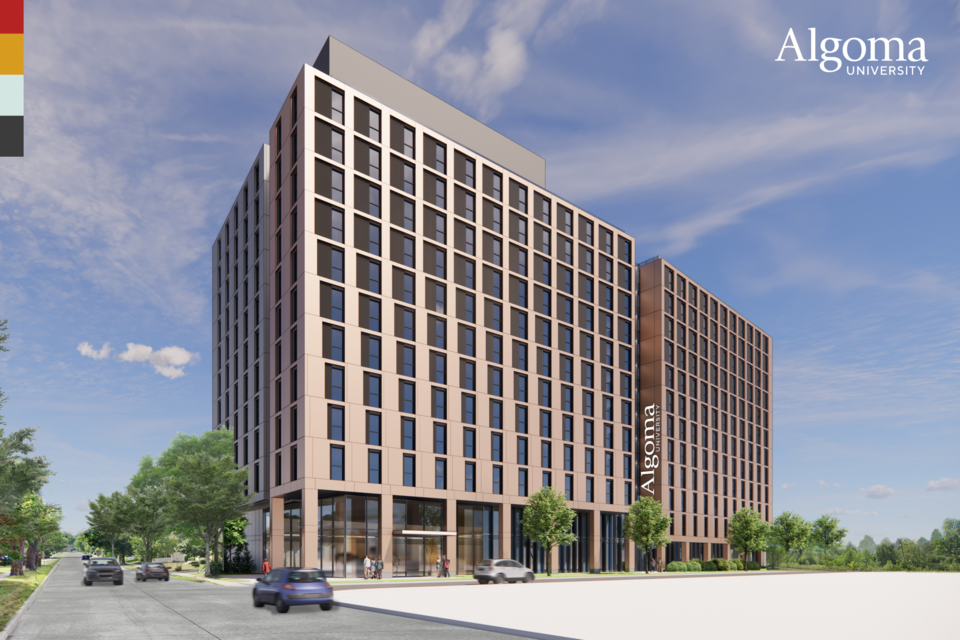Brampton's mayor, who has been critical of some post-secondary institutions that attract thousands of international students to his city, is applauding Sault Ste. Marie-based Algoma University for announcing the construction of a new student residence there.
Mayor Patrick Brown was among the dignitaries on hand for the announcement in Brampton on Tuesday by Algoma University that it's going ahead with the construction of the new 500-plus bed student residence. The event also attracted the MP and MPP for the riding, as well as several Brampton city councillors.
Algoma U president Asima Vezina said the announcement is a commitment by the university to help address the student housing crisis affecting Brampton. It will represent a $100-million investment through a 35-year agreement with developer Greenwin.
Greenwin will construct the residence building, which will be controlled and operated by Algoma U through a long-term lease agreement.
"This is an investment in our students," Vezina said during the presentation. "It is also an investment in our community of Brampton."
The building will offer single and double rooms, with 500-plus beds to be made available. Currently, Algoma U offers 220 beds across its three residences in Sault Ste. Marie.
Vezina noted the construction of a new residence in Sault Ste. Marie is still in the university's plans.
Construction will begin in the fall and the new residence is expected to welcome its first students in for the 2028-29 academic year.
Algoma U has been in the centre of much media coverage in recent months surrounding the Canada-wide practice of post-secondary institutions that focus on attracting international students. That practice can bring in big money and big problems, not the least of which is a student housing crisis affecting many communities across the country, including in Brampton and Sault Ste. Marie.
Brown has been critical of some of the post-secondary institutions that have been attracting international students, referring to them as cash cows or ATMs to separate students from their money purely for profit.
Brown clarified during the announcement that he doesn't consider Algoma U to be among the bad actors in the industry.
"I used the word cash cow for some of the wild west, in terms of private career colleges," said Brown.
He said unlike some other institutions, Algoma U has taken the tuition it charges to students and made investments into local infrastructure, as well as to the students.
"What we don't want to see is you drive into some commercial plaza and you see essentially a storefront and there's no investment in infrastructure," he said. "The criticism towards ATMs and cash cows is directed at those institutions that lack that academic Integrity we expect to have in Canada. What we want to see is more Algomas. We want to see is institutions that care about this academic journey."
Vezina said the university was already exploring reducing the number of international students before the federal government announced a new cap on the number of student visas it was issuing as a result of the crisis.
"When we look at the caps that are coming in we're actually in a very good place," said Vezina. "We're moving now to capturing the domestic market, which is going very well and we'll have a really nice blend of students from all around the world as well as domestic — both in Sault Ste. Marie and Brampton."
The Timmins campus has not attracted a significant number of international students, she noted.
Algoma U has not answered recent SooToday questions regarding the specific number of international students it has brought in.
"In 2024-25, Algoma U will receive roughly the same number of international permits as the University's 2022-23 international intake," said Algoma U communications manager Mo Kahlout in response to the a question after last month's Board of Governors meeting about the exact number of international students the university attracts.
Vezina was asked by media at Tuesday's event about the protests that affected the Brampton campus last year, in which a number of international students did not receive a passing grade. After a review by the university, 61 of those students received a passing grade.
She said that incident was a matter of academic integrity.
"We have to ensure that the students are graduating from Algoma have come from a very high standard of education," said Vezina.
"For some groups, protest is the way that thought — and still sometimes think — that they can get the grades that they want," she said. "That's not true. They have to show up for class. They have to learn they have to study hard in these programs. These programs are not easy. They're university programs. When you think about computer programming you can't miss for five classes. You have got to be there every single day. So our professors are really working hard to make sure that every student that comes the expectations for attendance that they know what they need to do to learn."
